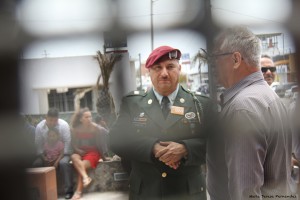“What would happen if we tore down this wall at the border? Look at the world we live in.”
Hector Barajas understands the need for the United States to guard its borders, he tells me, as we sit next to the border wall in Tijuana, Mexico. “Look at where we’re at. That’s just the world we live in.”
What Hector doesn’t understand is why the United States government is deporting U.S. military veterans. Hector Barajas, a U.S. Army Veteran who served from 1995 to 2001 in the 82nd Airborne was deported in 2004. Hector Barajas now lives in Tijuana and is actively involved in the Banished Veterans support group there.
The group estimates that there are at least 50 veterans living in the Tijuana-Rosarito area who have been deported from the U.S. But nobody really knows. At the Edges contacted Michael Wishnie via email, hoping to find out. Wishnie is clinical professor of law, and director of Jerome N. Frank Legal Services Organization at Yale Law School and represents low-wage workers, immigrants and veterans in legal cases. According to Wishnie, no research has yet been done to find out how many veterans have been deported to Baja California, Mexico. And the U.S. government doesn’t keep track.
But what we do know is that the Obama Administration has reached the 2 million mark. Last month, Obama surpassed 2 million deportations–more deportations than the entire Bush Administration and more than the sum total of all deportations before 1997.
And many are asking, why deport the veterans who risked their lives and served our country?
Change within
Hector Barajas is a committed Christian and years ago, embarked on a program of recovery. “I have to look at a lot of things I did,” says Barajas. “Change within” is one of the key things that affects a lot of things. And actions lead to change.”
In 2001, after serving for six years in the U.S. Army, Barajas was living as a civilian in California. Hanging out with a bad crowd, Barajas explains, on Christmas Eve 2001 he was involved in a crime. Barajas was charged with discharge of a firearm into a vehicle.
Barajas served a three-year prison sentence and was then delivered by immigration to Eloy Detention Center in Arizona. Barajas was detained in Eloy for one year where he worked on his own case but lost.
In 2004 he was deported, with an order of deportation for 20 years.
He returned to Los Angeles a year later in search of work. From 2005 to 2009 he worked in Los Angeles at union construction jobs, making $30/hour.
But Barajas had an old traffic ticket on his record, for wearing headphones while driving, and while he was deported, he neglected to pay the ticket. This resulted in a warrant for his arrest.
In 2009, a minor fender bender and resulting police report alerted the police of Barajas’s arrest warrant and deportation order. Barajas was arrested and sent to Point Loma detention center for three months.
In 2009, Barajas was deported again. This time, the deportation order was for life.
Families separated
 Barajas has an eight-year old daughter, Liliana Barajas, who lives with her mother in La Puente, California. They keep in touch on Skype, but it isn’t the same as being together. And now Liliana’s mother has been diagnosed with M.S. and Barajas is worried. She needs help and Hector feels frustrated that he can’t be there to provide.
Barajas has an eight-year old daughter, Liliana Barajas, who lives with her mother in La Puente, California. They keep in touch on Skype, but it isn’t the same as being together. And now Liliana’s mother has been diagnosed with M.S. and Barajas is worried. She needs help and Hector feels frustrated that he can’t be there to provide.
As a military veteran, Barajas is eligible for GI benefits but cannot use them. Because he doesn’t live in the United States, he can’t go to the VA hospital for medical treatment.
Waiting
Barajas is currently in process of filing for U.S. citizenship. Because the legal charge against him in 2001 was not “aggravated felony,” he is still eligible for citizenship.
And he waits. And he helps others wait.
After living with a group of his buddies who run a shelter for deported migrants in Rosarito, Mexico, Barajas decided to open a new shelter for deported veterans in downtown Tijuana. Earlier this month, on May 5, 2014, Barajas inaugurated the shelter, christened “The Bunker.”
He’s started a crowd-funding project to help with support for the daily needs of a growing number of veterans who he encounters on the streets of Tijuana. And the group has a Facebook page with over 3000 members. Thanks to social networking, Barajas is able to reach out and seek the assistance he needs to support his buddies.
Barajas is inspired by the hopefulness of the volunteers who come from Unitarian Universalist Church in San Diego.
“Maybe the U.S. can show the world an example by opening up the border. Actions lead to change, and maybe if we did show this leap of faith, things would change,” says Barajas.
But the irony of the government’s deportation policies leaves him frustrated:
“I do love and miss my country. We’re promoting defending the world, but now we’re deporting the defenders?”

